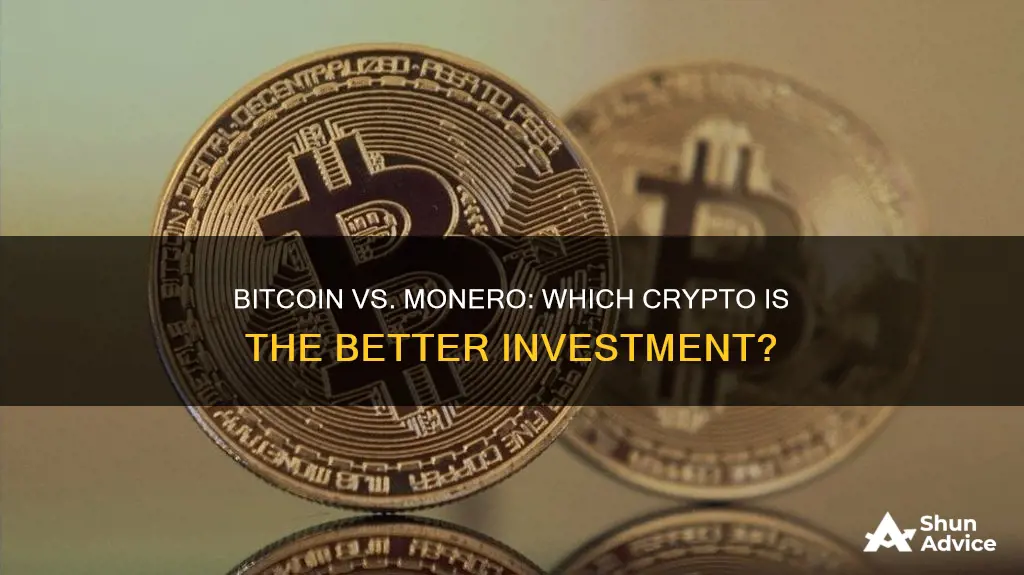
Bitcoin and Monero are two of the most popular cryptocurrencies. They are both decentralised and enable users to perform anonymous transactions. However, there are several differences between the two. This article will explore the features of each and discuss whether it is better to invest in Bitcoin or Monero.
| Characteristics | Values |
|---|---|
| Launch date | Bitcoin is older than Monero |
| Price | Bitcoin is more expensive than Monero |
| Privacy | Monero offers greater privacy than Bitcoin |
| Fungibility | Monero is 100% fungible, Bitcoin is not |
| Transaction speed | Monero is faster than Bitcoin |
| Scalability | Bitcoin is more scalable than Monero |
| Mining | Monero mining is more accessible than Bitcoin mining |
| Supply | Bitcoin has a maximum supply of 21,000,000, Monero does not have a supply limit |
| User base | Bitcoin has more users than Monero |
| Real-world use cases | Bitcoin has more real-world use cases than Monero |

Privacy and anonymity
Monero is a cryptocurrency designed to provide users with enhanced privacy and anonymity. Monero transactions are confidential, untraceable, and anonymous by default. This means that, unlike Bitcoin, which has a transparent blockchain, Monero transactions cannot be verified or traced by anyone outside the transaction. Monero uses three key technologies to ensure the privacy of its users: Stealth Addresses, Ring Signatures, and RingCT.
Stealth Addresses hide the receiver's address, while Ring Signatures hide the sender's address. RingCT, or Ring Confidential Transactions, conceal the transaction amount, providing an additional layer of privacy. These technologies work together to ensure that the sender, receiver, and amount of every transaction remain hidden.
Monero's privacy features have made it a popular choice for those seeking greater anonymity, including on the dark web. However, it is important to note that Monero's privacy protections are not infallible. Researchers have found flaws in its mixing process, which can potentially allow individual transactions to be extracted and linked to specific identities.
While Monero's developers are aware of these issues and have made improvements to enhance privacy, it is a constant cat-and-mouse battle to stay ahead of potential vulnerabilities. Additionally, law enforcement and regulators are increasingly targeting privacy-oriented cryptocurrencies due to their association with illicit activities. As a result, privacy-oriented tokens have been removed from popular exchanges in many jurisdictions, making decentralized exchanges and self-hosted wallets the only means of acquiring or using them.
Despite these challenges, Monero remains the most popular privacy-oriented cryptocurrency, offering users a higher degree of anonymity and untraceability compared to other options.
The Ultimate Guide to Bitcoin ETF Investing
You may want to see also

Fungibility
However, $10 bills have unique serial numbers, which means they are not completely fungible. A closer example of true fungibility is gold, where any ounce of gold of the same grade is worth the same as any other ounce.
Monero is considered to be fungible because the nature of the currency provides no way to link transactions or trace the history of any particular unit. Each unit of Monero (XMR) is functionally identical to any other unit. This is due to the privacy-enhancing technologies used in the Monero blockchain, which obfuscate transactions, addresses, amounts, balances, and transaction histories.
On the other hand, Bitcoin lacks fungibility because its blockchain is permanently traceable. Any unit of Bitcoin (BTC) can be tracked back to its creation, and if a coin has been used for illegal purposes, this history will be recorded in the blockchain forever. This lack of fungibility means that certain businesses will avoid accepting BTC that have been used for illegal purposes or activities that violate their Terms of Service.
The fungibility of Monero provides an advantage over Bitcoin and most other cryptocurrencies, as it offers true anonymity and privacy to its users.
Fractional Bitcoin Investing: A Guide to Getting Started
You may want to see also

Transaction speed
Bitcoin transactions can take up to 10 minutes on average, with transaction times varying wildly. This is due to factors such as network activity, hashrate, and transaction fees. If the Bitcoin network is congested, there will be a backlog of transactions in the mempool, which can be cleared by paying higher transaction fees.
Monero transactions, on the other hand, are much faster. In general, a Monero transaction will take less than 5 minutes, with an average block time of 2 minutes. This means that after announcing a transaction, it will take around 2 minutes for it to be mined into the next block.
For example, in one test transaction, it took 3 minutes and 46 seconds for the remote wallet to first become aware of the transaction as part of a Monero block on the blockchain. After about 26 minutes, the wallet had received 10 confirmations and the funds were fully confirmed and unlocked for spending.
The transaction speed of both cryptocurrencies can be influenced by factors such as block time, block size, transaction fees, and network traffic. However, Monero has been designed with an automatically adaptive block size limit, allowing it to handle future increases in transaction volume without the arguments that Bitcoin is currently facing over block size.
As such, if transaction speed is a key factor in your investment decision, then Monero may be the better choice.
Bitcoin SV: A Smart Investment Move?
You may want to see also

Scalability
Bitcoin, for example, has a maximum capacity of around 7 transactions per second (tps), while Ethereum can handle approximately 15 tps. In contrast, the Visa network can process over 24,000 tps. This difference in scalability can lead to congestion and slower transaction speeds during periods of high demand.
Monero, on the other hand, has a dynamic block size limit, allowing it to accommodate varying transaction volumes. The size of Monero blocks is flexible, and the blockchain can scale to meet changes in transaction volume. This means that, in theory, Monero has the potential to be more scalable than Bitcoin.
However, it is important to note that Monero's privacy features currently limit its ability to conduct certain types of intermediate transactions, such as atomic swaps, without interacting with a blockchain. This is because Monero's privacy features do not permit the use of functionality like non-interactive refund transactions or complex scripting, which are required for off-chain solutions. While research is ongoing in this area, it presents a potential limitation to Monero's scalability and its ability to compete with payment networks like Visa.
In summary, while Monero's dynamic block size gives it an advantage over Bitcoin in terms of scalability, there are still challenges and limitations to be addressed. The ability of any cryptocurrency to achieve true scalability while maintaining decentralization and security remains a complex issue that is yet to be fully resolved.
Blockchain Investment: Beyond Bitcoin and the Riot
You may want to see also

Real-world use cases
Bitcoin
Bitcoin is a cryptocurrency that has pioneered the use of blockchain technology for money transfers. Its blockchain is a public ledger system that validates and authenticates itself through the nodes of the chain. This system offers security, stability, and decentralization benefits.
Bitcoin's blockchain has been adopted by financial companies of all sizes, saving them time and money by eliminating bureaucratic red tape, making ledger systems real-time, and reducing third-party fees. For example, JPMorgan Chase's Onyx initiative uses blockchain technology for real-time settlement of interbank US dollar transactions.
Additionally, Bitcoin's blockchain has enabled the development of cryptocurrency transfer apps, which have gained popularity in the 2020s. These apps allow users to buy, sell, and transfer cryptocurrencies easily.
Monero
Monero (XMR) is a privacy-oriented cryptocurrency that focuses on anonymity and decentralization. It utilizes protocols like Ring Signatures, Stealth Addresses, and Ring Confidential Transactions (RingCT) to obscure transaction details and protect user privacy.
- Anonymous Routing: Monero's privacy features allow users to make transactions without revealing their identity, protecting their financial information from competitors or potential threats.
- Preventing Corporate Espionage and Competitor Research: Monero enables businesses to send money at any time, on any day, while maintaining privacy. This is especially useful when dealing with sensitive financial information that could be exploited by competitors.
- Protecting High-Net-Worth Individuals: Monero helps individuals with large sums of money hide their balances while still spending their crypto. This can be beneficial for those travelling to impoverished areas or places with high crime rates, reducing the risk of becoming a target for crimes.
- Anonymous Donations and Fundraising: Monero allows users to raise funds for causes without revealing their identities. This was notably used by WikiLeaks to raise funds for NSA whistleblower Edward Snowden's legal defence, despite the American government's ban on donations to his cause.
- Criminal Transactions for Contraband: Monero's privacy features have made it popular on the Dark Web for illegal transactions, including drugs, fake IDs, and even human slavery. This has led to authorities attempting to limit its use and increase scrutiny.
Mark Cuban's Crypto Portfolio: His Top Investments
You may want to see also
Frequently asked questions
Bitcoin was the first cryptocurrency to be launched and is the most expensive. It is decentralised and enables anonymous transactions. It is also widely accepted by online vendors and service providers.
Monero is highly secure and has been able to maintain the confidentiality of its coins and their owners. It is also highly fungible, meaning all the coins are identical and can be exchanged to uphold the privacy of its owners. It is also more scalable than Bitcoin, as it does not have a block size limit.
Bitcoin has a lack of privacy. If you give someone your Bitcoin wallet address, they can immediately see how much money you have. This can be a threat to your personal safety, and for businesses, it means vulnerability.
There is an unfounded accusation that associates Monero with illegal money, such as drug trafficking. It is also not limited in supply, so its value will increase slower than Bitcoin.







